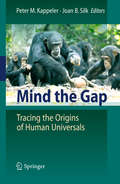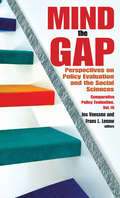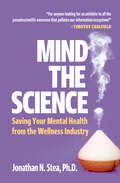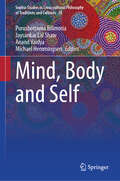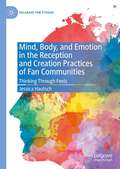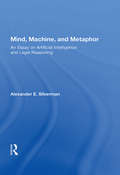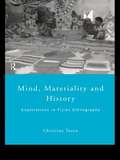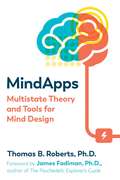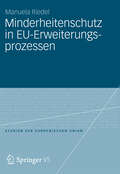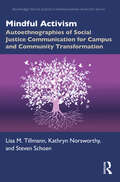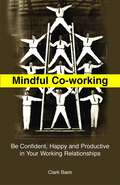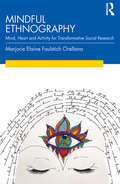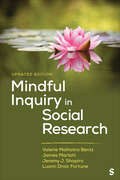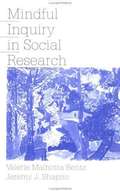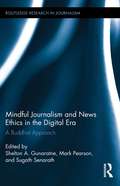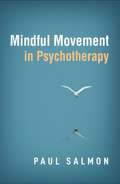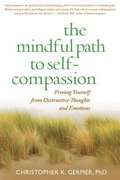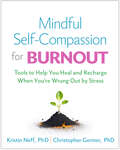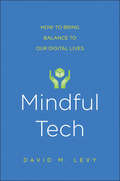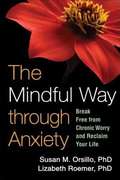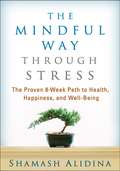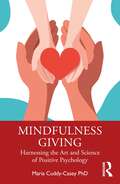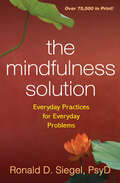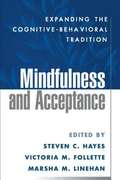- Table View
- List View
Mind the Gap
by Joan Silk Peter KappelerWhat makes us human? What made us become the way we are? One way to answer these questions is to identify the traits that all humans share, traits that are universal features of all human societies. Another way to do so is to ask how humans differ from other species, particularly from our closest relatives, the nonhuman primates. The contributors to this book pursue both approaches, in an effort to understand how evolution has shaped modern human behavior and societies.
Mind the Gap: Perspectives on Policy Evaluation and the Social Sciences (Comparative Policy Evaluation Ser.)
by Jos VaessenOver the past twenty to thirty years, evaluation has become increasingly important to the field of public policy. The number of people involved and specializing in evaluation has also increased markedly. Evidence of this trend can be found in the International Atlas of Evaluation, the establishment of new journals and evaluation societies, and the increase in systems of evaluation. Increasingly, the main reference point has become an assessment of the merit and value of interventions as such rather than the evaluator's disciplinary background. This growing importance of evaluation as an activity has also led to an increasing demand for the type of competencies evaluators should have.Evaluation began as a niche area within the social and behavioral sciences. It subsequently became linked to policy research and analysis, and has, more recently, become trans-disciplinary. This volume demonstrates an association between the evaluation tradition in a particular country or policy field and the nature of the relationship between social and behavioral science research and evaluative practice. This book seeks to offer comprehensive data, which lead to conclusions about patterns that transcend the gap between evaluation and the social scientific disciplines.Mind the Gap has a twofold aim. The first is to highlight and characterize the gap between evaluation practices and debates, and the substantive knowledge debates within the social and behavioral sciences. The second is to show why this gap is problematic for the practice of evaluation, while at the same time illustrating possible ways to build bridges. The book is centered on the value of producing useful evaluations grounded in social science theory and research.
Mind the Science: Saving your Mental Health from the Wellness Industry
by Jonathan N. SteaA clinical psychologist who regularly deals with some of society's most vulnerable exposes and debunks the predatory pseudoscience and grift of the multi-trillion-dollar wellness industry and points us towards a better way to take care of our mental health.Can the unbroken gaze of a lone man on a stage in front of hundreds of people truly alleviate their mental distress? Can Berlin Wall pills or a coffee enema cure depression? Can we improve our mental health with past-life regression therapy, cold-water shock therapy, rebirthing therapy? Wellness grifters and alternative-health snake oil salesmen are everywhere these days, and when our medical systems are under stress (and we are, too!) these costly purveyors of false hope are worse than a waste of money—they can lead us to delay badly needed care from real professionals, exacerbate our conditions and, in the most tragic of cases, even kill us. Today, people looking to care for their mental health face a market with at least 600 &“brands&” of psychotherapy—and counting. Most are ineffective, and many could be harmful. There exist countless unregulated providers of mental health services in the $5.6 trillion USD wellness industry and alternative medicine community looking to exploit people&’s financial and emotional vulnerabilities. The world of mental health care is very much caveat emptor: buyer beware. Having seen so many of his patients hurt by the pseudoscience circulating in the industry, Dr. Jonathan N. Stea is on a mission to expose its harm and protect the public from mental health misinformation. In a landscape of rampant burnout and at a time when mental health concerns are at a fever pitch, Mind the Science provides hope and real information to those who have been touched by mental illness, have been misled by false marketing, or are simply curious about the relationship between science and mental health.
Mind, Body and Self (Sophia Studies in Cross-cultural Philosophy of Traditions and Cultures #38)
by Purushottama Bilimoria Michael Hemmingsen Jaysankar Lal Shaw Anand VaidyaThis book is a unique collaboration of philosophers from across the world bringing together contemporary concepts of consciousness, the Māori conception of self, as well as Indian and Buddhist concepts of self and mental states. Contemporary concepts of consciousness include higher-order consciousness and phenomenological approaches. The idea behind this volume came from an international conference on ‘Mind, Body and Self’ held at Victoria University of Wellington; organized by the Society for Philosophy and Culture. The authors herein contribute to the relationship between concepts of self, mind, and body. The wide variety of contributors from across cultural backgrounds adds to a diverse and valuable conversation on the nature of human existence and thoughts of self. This book appeals to students and researchers working in philosophy and religious studies.
Mind, Body, and Emotion in the Reception and Creation Practices of Fan Communities: Thinking Through Feels (Palgrave Fan Studies)
by Jessica HautschThis book argues that fans’ creative works form a cognitive system; fanfic, fanvids, and gifs are not simply evidence of thinking, but acts of thinking. Drawing on work in cognitive linguistics, neuroscience, cognitive philosophy, and psychology—particularly focused on 4-E cognition, which rejects Cartesian dualism–this project demonstrates that cognition is an embodied, emotional, and distributed act that emerges from fans’ interactions with media texts, technological interfaces, and fan collectives. This mode of textual engagement is deeply physical, emotional, and social and is enacted through fanworks. By developing a theory of critical closeness, this book proposes a methodology for fruitfully putting cognitive science in conversation with fan studies.
Mind, Machine, And Metaphor: An Essay On Artificial Intelligence And Legal Reasoning
by Alexander E. SilvermanMind, Machine, and Metaphor is a rich, original, and wide-ranging view of legal theory in the context of artificial intelligence (AI) research. It is essential reading for legal theorists and for legal scholars and students of AI with an interest in each other's fields.
Mind, Materiality and History: Explorations in Fijian Ethnography (Material Cultures)
by Christina TorenHow do we become who we are? How is it that people are so similar in the ways they differ from one another, and so different in the ways they are the same?Christina Toren's theory of mind as not only a physical phenomenon, but an historical one, sets out to answer these questions by examining how the material world of objects and other people informs the constitution of mind in persons over time.This theory of embodied mind as a microhistorical process is set out in the first chapter, providing a context for the nine papers that follow. Questions explored include the way meaning-making processes reference an historically specific world and are responsible at once for continuity and change, how ritual informs children's constitution of the categories adults use to describe the world, and how people represent their relationships with one another and in so doing come to embody history.Mind, Materiality and History has direct relevance to current debates on the nature of mind and consciousness, and demonstrates the centrality of the study of children to social analysis. It will be a valuable resource for students and scholars with an interest in anthropological theory and methodology, as well as those engaged in material culture studies.
Mindapps: Multistate Theory and Tools for Mind Design
by Thomas B. RobertsAn exploration of “mind design” technologies and practices--mindapps--that boost intellectual capacity and enable new ways of thought and action • Reveals how mindapps transform the patterns of our mind-body complex and help generate new ideas by enabling access to new mind states • Examines the singlestate fallacy--the myth that useful thinking only occurs in our ordinary awake mental state • Explores a wealth of mindapp practices and techniques, including microdosing with psychedelics, yoga and martial arts, hypnosis, breathing techniques, lucid dreaming, rites of passage, biofeedback and neurofeedback, and transcranial brain stimulation Just as we can write and install apps in our electronic devices, we can construct “mindapps” and install them in our brain-mind complex, and as just as digital apps add capabilities to our devices, mindapps can expand our mental powers and creative abilities, allowing us to intentionally redesign our minds. Using psychedelics as the prime example, Thomas B. Roberts explores the many different kinds of mindapps, including meditation, other psychoactive plants and chemicals, sensory overload and deprivation, biofeedback and neurofeedback, hypnosis and suggestion, sleep and lucid dreaming, creative imagery, transcranial brain stimulation and optical brain stimulation, rites of passage, martial arts and exercise routines, yoga, breathing techniques, and contemplative prayer. He also looks at the future of mindapps, the potential for new mindapps yet to be invented, and how installing multiple mindapps can produce new, yet to be explored mind states. Drawing on decades of research, he shows how psychedelics in particular are “ideagens”--powerful tools for generating new ideas and new ways of thinking. Uniting the many forms of mindapps into one overall Multistate Mind Theory, Roberts examines the singlestate fallacy--the myth that useful thinking only occurs in our ordinary awake mental state--and demonstrates the many mind-body states we are capable of. He shows how mindapps not only allow us to design and redesign our own minds but also offer benefits for artistic performance, mystical and spiritual experience, and scientific research by improving creativity, open-mindedness, problem solving, and inner-brain connections. Reformulating how we think about the human mind, Mindapps unveils the new multistate landscape of the mind and how we can each enter the world of mind design.
Minderheitenschutz in EU-Erweiterungsprozessen
by Manuela RiedelIm Vertrag von Lissabon wird die Wahrung der Rechte von Minderheiten ausdrücklich als Wert der Europäischen Union und ihrer Mitgliedstaaten genannt. Manuela Riedel arbeitet heraus, wie sich der Schutz von Minderheiten von einem zunächst nur im Rahmen von EU-Erweiterungsprozessen relevanten Kriterium zu einem gemeinsamen europäischen Wert entwickeln konnte. Hierzu analysiert die Autorin die von einem Spannungsfeld von Werten und Sicherheitsinteressen bestimmten Prozesse, Motive und Akteure, die die von den Beitrittsländern zu erfüllenden Minderheitenschutzstandards geprägt haben. Anhand der parallelen Beobachtung der EU-internen Entwicklung zeigt die Autorin, dass der im Zuge der Beitrittsvorbereitungen weiterentwickelte Schutz von Minderheiten schrittweise in die für alle Mitgliedstaaten geltenden Vertragswerke und Politiken integriert wurde und somit künftig nicht nur in EU-Beitrittsverhandlungen, sondern auch in der Europäischen Union als politikfeldübergreifendes Thema stärker an Bedeutung gewinnen wird.
Mindful Activism: Autoethnographies of Social Justice Communication for Campus and Community Transformation (Routledge Social Justice Communication Activism Series)
by Lisa M. Tillmann Kathryn Norsworthy Steven SchoenThis collection immerses scholars of communication and related disciplines in narratives of and conversations about social-justice-focused activism. Through autoethnographic essays, Mindful Activism chronicles the authors’ experiences as activist academics challenging and seeking to remedy injustices on campus and in local and global communities. Those experiences range from engaging in a single activist act to collaborating over many years with oppressed communities and social change groups. Building upon communication activism research and following a liberation-based transformative learning model, the book shows both activism in action and deep reflection on that activism. The authors re-experience activist experiences, draw out lessons, and invite readers to apply those to their own social justice endeavors. Mindful Activism also demonstrates how mindfulness supports activists in deepening their awareness and understanding of themselves, others, and social systems. This orientation increases the likelihood that activists will remain grounded enough to respond to injustice mindfully/effectively. The book will enrich courses on activism, social justice, dialogue, narrative inquiry, qualitative methods, autoethnography, and general graduate studies, and will resonate with scholars committed to building a more equitable and just world.
Mindful Co-Working: Be Confident, Happy and Productive in Your Working Relationships
by Clark BaimTransform and enhance your working relationships through mindful co-working. Are you making the most of your co-working relationships? Most of us work with others and spend as much time with colleagues as we do with our families - so it's important our working relationships run smoothly. By helping workers become more attuned to their colleagues, mindful co-working removes the pressure and stress of competition from working relationships to make them both more enjoyable and more effective. Author Clark Baim shares the secrets he has learned with co-workers and co-trainers during more than 2,000 training workshops. He also includes practical exercises and useful tools to help you perfect the art, whatever field you work in. This indispensable guide to co-working is required reading for anyone who wants to work confidently with colleagues - and enjoy it!
Mindful Ethnography: Mind, Heart and Activity for Transformative Social Research
by Marjorie Faulstich OrellanaEthnography, with all its limitations, has as its strongest impulse the quest to see and understand “others” on their own terms and to step out of our own viewpoints in order to do so. Conjoining ethnography with mindfulness, this book aims to support the best aspects of ethnography by enhancing the capacity to listen more deeply, see more expansively, keep a check on our biases and connect more compassionately with others. Mindful Ethnography addresses a central dilemma of ethnography: the relationship of self and other. It suggests ways of viewing the world from different perspectives, getting beyond the categories of our culture and working with our own thoughts and feelings even as we aim to understand those of our participants. Chapters address various stages of ethnographic research: entering a field and seeing it for the first time, immersing in ongoing participant observation, writing up elaborated fieldnotes, analysis, the re-presentation of results and letting it go. It offers illustrations and activities for researchers to try. The book is aimed at students and researchers who are stepping into the craft of ethnography or looking for new ways in and through ethnographic research. It is for researchers who want to integrate scholarship, social activism and spiritual pursuits in order to do research that is deeply engaged with and transformative of the world.
Mindful Inquiry in Social Research
by Valerie Malhotra Bentz Jeremy J. Shapiro James Marlatt Luann Drolc FortuneThe first edition of this classic text introduced researchers and students to a broad range of approaches that are grounded philosophically and are relevant to real contexts. This new edition reflects developments in social research and changes in the global environment. The authors broaden their conception of mindfulness, and show how mindful inquirers can maximize positive outcomes for participants, organizations, communities, and themselves. The first five chapters describe the application of mindful inquiry, and the following nine introduce cultures of inquiry and research traditions, theories, methods, and techniques. Chapters contain activities that provide immediate engagement with learning, suggested readings, and lists of skills for researchers.
Mindful Inquiry in Social Research
by Valerie Malhotra Bentz Jeremy J. Shapiro James Marlatt Luann Drolc FortuneThe first edition of this classic text introduced researchers and students to a broad range of approaches that are grounded philosophically and are relevant to real contexts. This new edition reflects developments in social research and changes in the global environment. The authors broaden their conception of mindfulness, and show how mindful inquirers can maximize positive outcomes for participants, organizations, communities, and themselves. The first five chapters describe the application of mindful inquiry, and the following nine introduce cultures of inquiry and research traditions, theories, methods, and techniques. Chapters contain activities that provide immediate engagement with learning, suggested readings, and lists of skills for researchers.
Mindful Inquiry in Social Research
by Valerie Malhotra Bentz Jeremy J. ShapiroInnovative introduction to research in the social and human sciences, guides students through the maze of research traditions, cultures of inquiry, and epistemological frameworks that blanket the intellectual landscape. Mindful inquiry empowes the researcher both psychologically and philosophically by putting the researcher, rather than research techniques, at the center of the research process.
Mindful Journalism and News Ethics in the Digital Era: A Buddhist Approach (Routledge Research in Journalism)
by Mark Pearson Shelton A. Gunaratne Sugath SenarathThis book aims to be the first comprehensive exposition of "mindful journalism"—drawn from core Buddhist ethical principles—as a fresh approach to journalism ethics. It suggests that Buddhist mindfulness strategies can be applied purposively in journalism to add clarity, fairness and equity to news decision-making and to offer a moral compass to journalists facing ethical dilemmas in their work. It comes at a time when ethical values in the news media are in crisis from a range of technological, commercial and social factors, and when both Buddhism and mindfulness have gained considerable acceptance in Western societies. Further, it aims to set out foundational principles to assist journalists dealing with vulnerable sources and recovering from traumatic assignments.
Mindful Movement in Psychotherapy
by Paul SalmonMany mental health clinicians--even those well acquainted with mindfulness--still view physical, body-oriented techniques as outside their scope of practice. In this accessible book, clinical psychologist, exercise physiologist, and yoga and mindfulness teacher Paul Salmon gives therapists of any orientation the tools to use mindful movement with clients. Salmon shows how simple practices like breathing, walking, and yoga-like stretches can help clients center their attention in the present moment with curiosity and self-acceptance. He summarizes research on the benefits of movement for specific mental and physical health conditions and provides vivid case examples and scripts. Purchasers get access to a companion website where they can download audio recordings of 29 guided practices.
Mindful Path to Self-Compassion
by Christopher Germer"Buck up." "Stop feeling sorry for yourself." "Don t ruin everything." When you are anxious, sad, angry, or lonely, do you hear this self-critical voice? What would happen if, instead of fighting difficult emotions, we accepted them? Over his decades of experience as a therapist and mindfulness meditation practitioner, Dr. Christopher Germer has learned a paradoxical lesson We all want to avoid pain, but letting it in--and responding compassionately to our own imperfections, without judgment or self-blame--are essential steps on the path to healing. This wise and eloquent book illuminates the power of self-compassion and offers creative, scientifically grounded strategies for putting it into action. You'll master practical techniques for living more fully in the present moment especially when hard-to-bear emotions arise--and for being kind to yourself when you need it the most. Free audio downloads of the meditation exercises are available at the author's website www.mindfulselfcompassion.org.
Mindful Self-Compassion for Burnout: Tools to Help You Heal and Recharge When You're Wrung Out by Stress
by Kristin Neff Christopher Germer"I'm tired of feeling stressed out every day." "I can't stand having so little impact, despite caring so much and working so hard." "I just don't have anything left to give." Over years of developing and teaching their renowned Mindful Self-Compassion program, Kristin Neff and Christopher Germer have found MSC to be uniquely helpful for people struggling with the soul-draining depletion of burnout--from health care professionals, teachers, and caregivers, to tapped-out business owners and employees. Each chapter in this engaging book offers an empathic story of someone stretched to their limits and an easily digestible bite of self-compassion that culminates in a simple anti-burnout tool based on MSC practices. Learn quick and powerful ways to recharge your batteries, de-stress, and, above all, be kind to yourself--so you can be there for others.
Mindful Tech
by David M. LevyFrom email to smart phones, and from social media to Google searches, digital technologies have transformed the way we learn, entertain ourselves, socialize, and work. Despite their usefulness, these technologies have often led to information overload, stress, and distraction. In recent years many of us have begun to look at the pluses and minuses of our online lives and to ask how we might more skillfully use the tools we've developed. David M. Levy, who has lived his life between the "fast world" of high tech and the "slow world" of contemplation, offers a welcome guide to being more relaxed, attentive, and emotionally balanced, and more effective, while online. In a series of exercises carefully designed to help readers observe and reflect on their own use, Levy has readers watch themselves closely while emailing and while multitasking, and also to experiment withunplugging for a specified period. Never prescriptive, the book opens up new avenues for self-inquiry and will allow readers-in the workplace, in the classroom, and in the privacy of their homes-to make meaningful and powerful changes. "
Mindful Way through Anxiety
by Susan OrsilloYou can't just "get over" anxiety. In fact, the very things most people do to try to feel better--avoiding feared situations, pushing worry out of mind only make the problem worse. Leading psychologists Susan M. Orsillo and Lizabeth Roemer present a powerful new alternative that can help you break free of anxiety by fundamentally changing how you relate to it. With clarity and compassion, this book describes clinically tested mindfulness practices specifically tailored for anxiety in its many forms. Learn step-by-step strategies for gaining awareness of anxious feelings without letting them escalate; loosening the grip of worry and fear; and achieving a new level of emotional and physical well-being. Free audio downloads of mindfulness exercises plus other resources are available at the authors' website, www.mindfulwaythroughanxietybook.com.
Mindful Way through Stress
by Shamash AlidinaTake a deep breath. Feeling less stressed already? Bestselling author Shamash Alidina shows just how simple it is to master the proven techniques of mindfulness-based stress reduction (MBSR) in this engaging guide. MBSR has enhanced the physical and emotional well-being of hundreds of thousands of people around the world. In as little as 10 minutes a day over 8 weeks, you'll be taken step by step through a carefully structured sequence of guided meditations (available to purchasers for download at the companion website) and easy yoga exercises. Vivid stories, everyday examples, and opportunities for self-reflection make the book especially inviting. Science shows that MBSR works--and now it is easier than ever to get started.
Mindfulness Giving: Harnessing the Art and Science of Positive Psychology
by Maria Cuddy-CaseyThis accessible book offers a unique, evidence-based perspective on the art and science of giving. It combines concepts from psychology, neuroscience and social science theory with stories from interviewees on their experiences as a giver and receiver.This book offers a holistic overview of the reciprocal aspects of giving, strategies for selecting a recipient of a gift in a never-ending sea of need, and a guide to developing one’s personal philosophy, boundary, and plan on giving. As people seek to reconnect and find meaning, this book offers a venue for exploration. Covering topics such as empowering children to give, the financial considerations of giving, compassion fatigue and how to set healthy boundaries, this book helps readers think about unique ways of giving. Through the use of action plans and worksheets, readers are encouraged to consider their own place in giving, empower themselves as a change agent, and recognize the positive social power and ripple effect of giving.Mindfulness Giving is valuable reading for students of positive psychology, social and health psychology, social work, and sociology, as well as professionals and coaches working in self-improvement and self-care.
Mindfulness Solution
by Ronald SiegelMindfulness offers a path to well-being and tools for coping with life's inevitable hurdles. And though mindfulness may sound exotic, you can cultivate it--and reap its proven benefits--without special training or lots of spare time. Trusted therapist and mindfulness expert Dr. Ronald Siegel shows exactly how in this inviting guide. You'll get effective strategies to use while driving to work, walking the dog, or washing the dishes, plus tips on creating a formal practice routine in as little as 20 minutes a day. Flexible, step-by-step action plans will help you become more focused and efficient in daily life; cope with difficult feelings, such as anger and sadness; deepen your connection to your spouse or partner; feel more rested and less stressed; curb unhealthy habits; find relief from anxiety and depression; and resolve stress-related pain, insomnia, and other physical problems. Free audio downloads of the meditation exercises are available at the author's website www.mindfulness-solution.com. Start living a more balanced life--today.
Mindfulness and Acceptance
by Victoria Follette Steven HayesThis volume examines the role of mindfulness principles and practices in a range of well-established cognitive and behavioral treatment approaches. Leading scientist-practitioners describe how their respective modalities incorporate such nontraditional themes as mindfulness, acceptance, values, spirituality, being in relationship, focusing on the present moment, and emotional deepening. Coverage includes acceptance and commitment therapy, dialectical behavior therapy, mindfulness-based cognitive therapy, integrative behavioral couple therapy, behavioral activation, and functional analytic psychotherapy. Contributors describe their clinical methods and goals, articulate their theoretical models, and examine similarities to and differences from other approaches.
